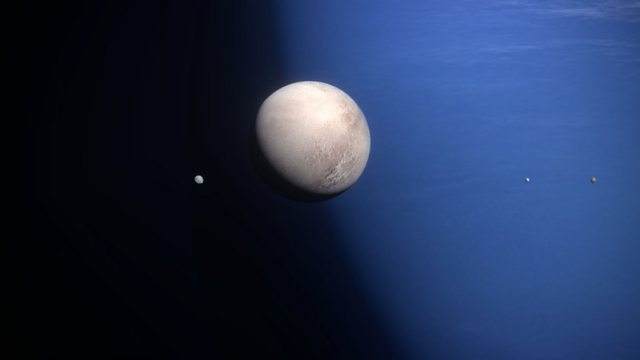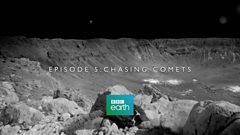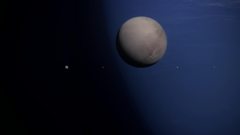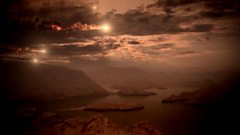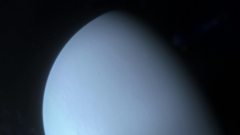Into the Darkness: Ice Worlds
In the final episode, Professor Brian Cox journeys to the remotest part of the solar system, a place that the most mysterious planets call home.
In the final episode, Professor Brian Cox journeys to the remotest part of the solar system, a place that the most mysterious planets call home. These worlds remain shadowy for a simple reason. Beyond Saturn, we have only ever visited the most distant planets once.
Uranus – barely visible to the naked eye - was once thought to be the furthest planet from the Sun. But with the telescope and some careful viewing we discovered it had a companion: Neptune. Thanks to a rare alignment of the planets in 1976, Voyager 2 was sent for our only fly-by of these ice worlds. There we discovered far more vibrant planets than we ever imagined. Even at such cold temperatures, great storms whip around these frozen worlds that are home to spectacular moons and intricate ring systems. After a few hours of observation at each planet, Voyager 2 left them behind. We have never returned.
For decades that was as far as we got, until 2015 when Nasa’s New Horizons probe pushed the frontier even further into space. with its extraordinary passage to the dwarf planet Pluto. Once again, all our assumptions about this distant world were wrong. Pluto is alive with ice volcanoes, dunes, and geysers - even a subsurface ocean. What’s more, we discovered that Pluto isn’t alone out there - there is a plethora of weird icy companions, which are redefining everything we thought we knew about the strange, distant reaches of our solar system.
Last on
More episodes
Previous
Next
You are at the last episode
Clips
-
![]()
Secrets of the Solar System: Chasing comets
Duration: 05:18
-
![]()
Triton finds a new home
Duration: 01:09
-
![]()
An age of discovery
Duration: 01:18
-
![]()
Voyager reaches a new class of planet
Duration: 02:21
Credits
| Role | Contributor |
|---|---|
| Presenter | Brian Cox |
| Executive Producer | Andrew Cohen |
| Series Producer | Gideon Bradshaw |
| Production Manager | Evih Efue |
| Composer | Bleeding Fingers |
| Director | Martin Johnson |
| Editor | Louise Salkow |
Broadcasts
- Tue 25 Jun 2019 21:00
- Sun 30 Jun 2019 18:00
- Sat 13 Jul 2019 01:40
- Sat 28 Dec 2019 10:55
- Fri 19 Jun 2020 19:00±«Óãtv Two except Wales & Wales HD
- Thu 25 Jun 2020 18:20±«Óãtv Two Wales & Wales HD only
- Fri 15 Jan 2021 14:00
- Wed 18 Aug 2021 21:00
- Thu 19 Aug 2021 02:45
Download your FREE Open University poster about our Solar System’s planets and moons
Visit OpenLearn and find out more about our Solar System.
